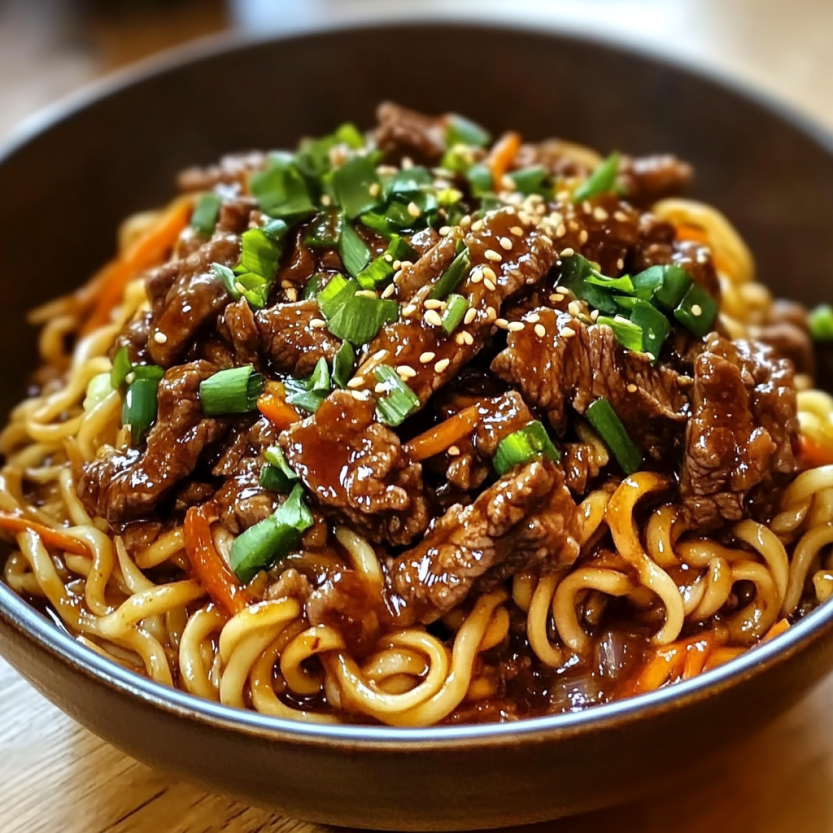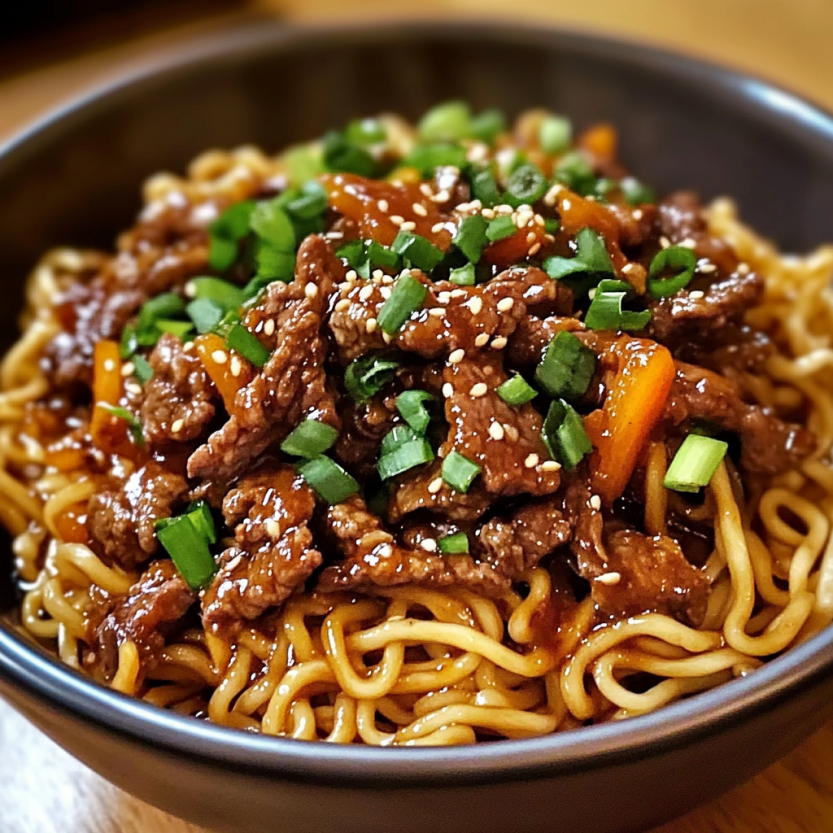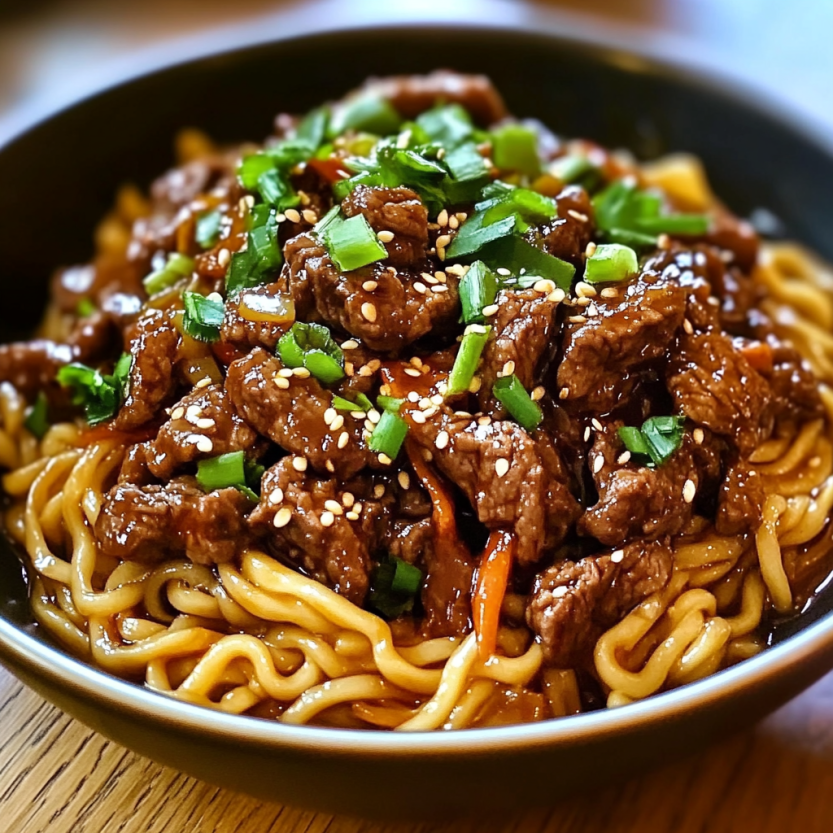 Save
Save
This sweet and savory hoisin beef noodle dish has become my weeknight hero for those evenings when I want something truly flavorful without spending hours in the kitchen. The combination of tender beef slices glazed in rich hoisin sauce and chewy noodles creates a restaurant-quality meal that comes together in just 25 minutes.
I first made this recipe during a particularly hectic work week when I needed something quick yet satisfying. The rich aroma of the beef marinating in hoisin sauce filled my kitchen and immediately transported me to my favorite Asian restaurant. Since then it has become my go-to impressive meal when friends drop by unexpectedly.
Ingredients
- Flank or sirloin steak: thinly sliced against the grain ensures tenderness in every bite
- Hoisin sauce: provides that signature sweet and savory depth look for a quality brand without corn syrup for best flavor
- Soy sauce: adds umami dimension use lowsodium if watching salt intake
- Sesame oil: just a small amount delivers remarkable nutty aroma
- Fresh garlic and ginger: the aromatic foundation that elevates this dish use fresh not powdered
- Ramen or lo mein noodles: their chewy texture perfectly captures the sauce
- Oyster sauce: optional but adds incredible richness to the final dish
- Fresh vegetables: add color nutrition and textural contrast
Step-by-Step Instructions
- Marinate the Beef:
- Combine thinly sliced beef with hoisin sauce soy sauce sesame oil garlic ginger and cornstarch in a bowl. Make sure every piece is coated evenly and let it sit for at least 15 minutes. This step not only infuses flavor but also tenderizes the meat and helps create a silky texture once cooked.
- Prepare the Noodles:
- Cook your noodles according to package directions but aim for slightly al dente as they will continue cooking when tossed with the hot beef and sauce. Rinse immediately with cold water after draining to stop the cooking process and prevent sticking. Toss with a few drops of oil if not using right away.
- Create the Sauce:
- Mix all sauce ingredients in a small bowl until the sugar or honey completely dissolves. The combination of hoisin soy sauce oyster sauce sweetener and rice vinegar creates a perfect balance of sweet tangy and savory notes that will coat every strand of noodle.
- Sear the Beef:
- Heat your wok or skillet until it is smoking hot before adding a small amount of oil. Sear the beef in small batches without overcrowding the pan. Each batch should take only 1 to 2 minutes and still have some pink in the center as it will continue cooking later.
- Cook the Vegetables:
- Using the same pan with all those flavorful beef bits stir fry your vegetables. Start with harder vegetables like carrots then add bell peppers. Keep them moving constantly for even cooking while maintaining some crispness.
- Combine Everything:
- Return the beef to the pan add the noodles and pour the sauce over everything. Toss continuously over medium high heat for about 2 minutes until everything is well coated and heated through. The sauce will thicken slightly and create a glossy coating on both beef and noodles.
 Save
Save
The hoisin sauce is truly the star of this recipe. I discovered its magic years ago when a Chinese friend showed me how to make proper stirfry. She insisted on using it as both a marinade component and in the final sauce which creates layers of flavor that keep you coming back for more. My family now judges all Asian takeout against this homemade version.
Proper Slicing Technique
For the most tender beef results always slice your steak against the grain. This means identifying the direction of the muscle fibers and cutting perpendicular to them. For flank steak this is particularly important as cutting with the grain will result in chewy rather than tender pieces. If your beef seems difficult to slice thinly try placing it in the freezer for 15 to 20 minutes first which firms it up enough to make thin slicing easier.
Vegetable Variations
This recipe welcomes almost any vegetable you have on hand. Snow peas bok choy mushrooms bean sprouts or broccoli all work beautifully. The key is adding them to the wok in order of cooking time hardest vegetables first. For leafy greens like spinach or bok choy add them last as they only need seconds to wilt. During summer months I load this dish with farmers market finds while winter versions might feature heartier vegetables like broccoli or cabbage.
Serving Suggestions
Serve these noodles family style in a large serving bowl with additional garnishes on the side for everyone to customize their portion. A small dish of chili oil sriracha or sambal oelek allows heat lovers to adjust spice levels. For a complete meal consider serving with a simple side of cucumber salad dressed with rice vinegar and a touch of sugar. The cool crisp cucumbers provide a refreshing contrast to the rich noodles.
Storage and Reheating
This dish keeps wonderfully in the refrigerator for up to 3 days making it perfect for meal prep. Store in airtight containers and reheat gently in a skillet with a splash of water to refresh the sauce. The flavors actually develop overnight making day two sometimes even better than the first day. If the noodles seem to have absorbed much of the sauce simply whisk together a small amount of additional hoisin and soy sauce to revive the dish.
 Save
Save
Recipe Questions
- → What can I substitute for flank or sirloin steak?
You can substitute with ribeye, NY strip, or even ground beef for a different texture. For a non-beef option, thinly sliced chicken breast, pork tenderloin, or firm tofu work well. Just adjust cooking times accordingly - chicken needs to be fully cooked through, while tofu requires less time than beef.
- → Can I make this dish ahead of time?
Yes! You can prepare the components separately up to 2 days ahead. Marinate and cook the beef, prepare the sauce, and cook the noodles, storing everything separately in the refrigerator. When ready to serve, quickly stir-fry the vegetables, then combine with the beef, noodles, and sauce to heat through. This makes it perfect for meal prep.
- → What type of noodles work best for this dish?
While the dish calls for ramen or lo mein noodles, you can substitute with other Asian-style noodles like udon, soba, or rice noodles. Even linguine or spaghetti can work in a pinch. Each noodle type will provide a slightly different texture - thicker noodles like udon will be chewier, while rice noodles offer a lighter feel.
- → How can I make this dish spicier?
To add heat, incorporate sliced fresh chilies, dried chili flakes, or sriracha into the sauce. Alternatively, drizzle with chili oil before serving. For a more complex spice, add a teaspoon of gochujang (Korean chili paste) or sambal oelek to the sauce mixture. You can also serve with sliced fresh jalapeños on the side.
- → What vegetables can I add to this dish?
This versatile dish welcomes many vegetables beyond the suggested carrots and bell peppers. Try adding snow peas, broccoli florets, mushrooms, baby corn, water chestnuts, or spinach. For crunch, consider bean sprouts or thinly sliced cabbage added at the very end of cooking. Aim for a variety of colors and textures.
- → Is there a vegetarian version of this dish?
Absolutely! Replace the beef with extra-firm tofu (pressed and cubed) or seitan. Instead of oyster sauce, use vegetarian mushroom-based oyster sauce or more hoisin. You can also add meaty mushrooms like shiitake or king oyster for texture. Consider increasing the vegetables for a more substantial meat-free meal.